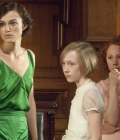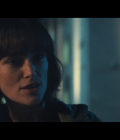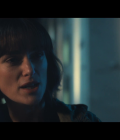ELLE US – novembre 2018
Keira Knightley Knows Hollywood Isn’t Set Up for New Moms
While filming the now-beloved 2003 rom-com « Love Actually », Keira Knightley, then an up-and-coming British actress whose winning turn in « Bend It Like Beckham » helped make it a smash hit, told the director her next project was « some pirate thing—probably a disaster. » Instead, « Pirates of the Caribbean: The Curse of the Black Pearl » went on to gross over $650 million. By 2008, after appearing in the next two installments, Knightley was a household name, and the second-highest-paid actress in Hollywood. But it wasn’t until recently that she began to ask about her pay in relation to that of her male costars. « It didn’t even occur to me, » says Knightley, who lives in London with her husband, musician James Righton, and their three-year-old daughter. « It felt like something you couldn’t question. But I do ask now, and I can safely say that in my last two films, I have not made less than the men I’ve been working with. »
Since « Pirates », Knightley has mostly appeared in independent films, many of them period dramas, and garnered two Academy Award nominations. There’s already Oscar talk for her starring role in the biopic « Colette », about Paris’s famed Belle Epoque author whose ghostwriting for her husband led to him receiving all the credit. Colette was also an influencer, a century before the advent of social media, prompting many Parisian women to model themselves in her likeness. It is, in other words, a movie perfectly attuned to this moment.
This month, Knightley appears as the Sugar Plum Fairy in Disney’s « The Nutcracker and the Four Realms »; next spring, she stars alongside Alexander Skarsgård in the post-WWII drama « The Aftermath », produced by Ridley Scott. After that? « My next film is hopefully with a woman director, » she says. « We need our stories told through our own eyes. »
You became famous when you were just 18. Are there aspects of that experience that were hard for you as a young woman?
Yes. The double standards that women face are so extreme, particularly at that age. Men are meant to be getting drunk and falling out of clubs. Then [people] go, « Yeah, you’re cool! » But if I’d been seen as a party girl, it could’ve been the end of my career. We also live in a society that gives unbelievably difficult messages to young women. You’re meant to be thin, but not that thin. You’re supposed to go out and have sex, then people say, « No, you’re a slut. » You’re always too much of something. What’s so interesting about Colette is that she was breaking all those rules. She felt that she had the right to live her life in the way that she saw fit.
She seemed to really enjoy her celebrity. Was exploring that part of what drew you to the film?
She was a sparkly, jewel-like creature who got off on being provocative. I love that spirit of rebellion. She was an unapologetic extrovert, and I appreciate that because I’m an introvert. I always end up hiding in the corner. But I like looking at extroverts and playing them because I think they’re fascinating.
One thing the film makes clear is that as much as things have changed for women, in so many ways they haven’t.
Yeah, it is kind of depressing. But remember that in the early 2000s, everybody thought that [women had already achieved equality]. So at least we’re realizing there’s work to be done. I think that’s a much better place than this weird denial.
What do you think the difference is between male and female directors?
Of course men can direct women brilliantly, but I think that often women storytellers are subtler than men. And I think that often their work gets devalued because of the subtlety, and that’s ridiculous. There is also ageism with directors: You want the young, sexy female directors, but you don’t necessarily want the middle-aged female directors. We need all those voices. We need to be talking about how difficult it is for women to work with small children, too. We’re losing loads of women because with the way the industry is set up, they can’t direct and have kids at the same time.
You’ve spoken about wanting younger people to feel freer to make mistakes. Are there any mistakes you made that you now realize weren’t such a big deal?
I think my biggest mistake, actually, was trying to be perfect. I was so convinced there was a way to make everybody happy. But there’s joy in knowing that’s impossible. A lot of the time, trying to figure out how the fuck you get off the floor again is the most interesting part of your life.

 L’Étrangleur de Boston
L’Étrangleur de Boston Black Doves
Black Doves The Other Typist (mini-série)
The Other Typist (mini-série)

















 CHANEL - Coco Mademoiselle
CHANEL - Coco Mademoiselle Miss Révolution
Miss Révolution Joyeuse fin du monde
Joyeuse fin du monde Charlotte
Charlotte